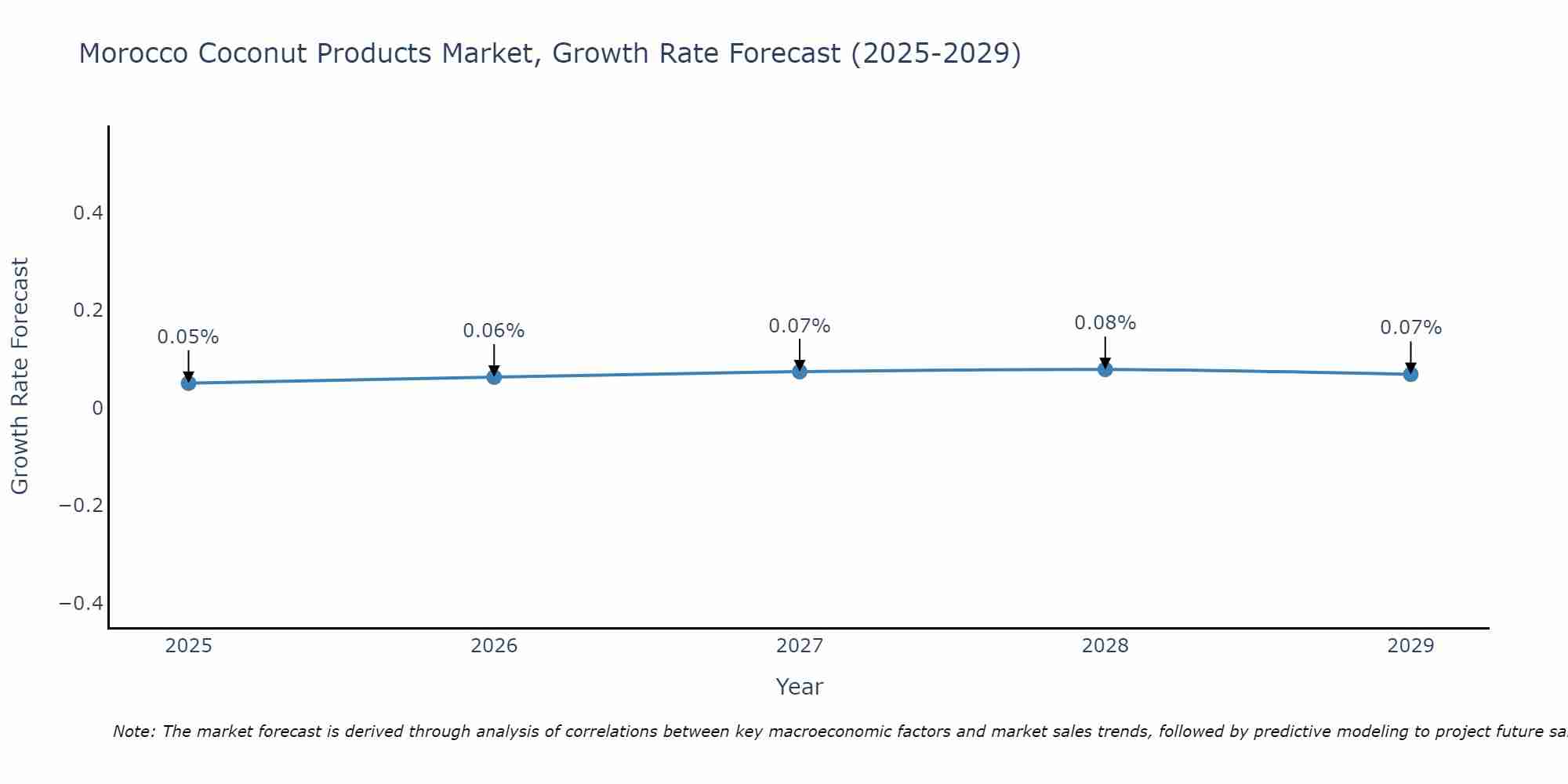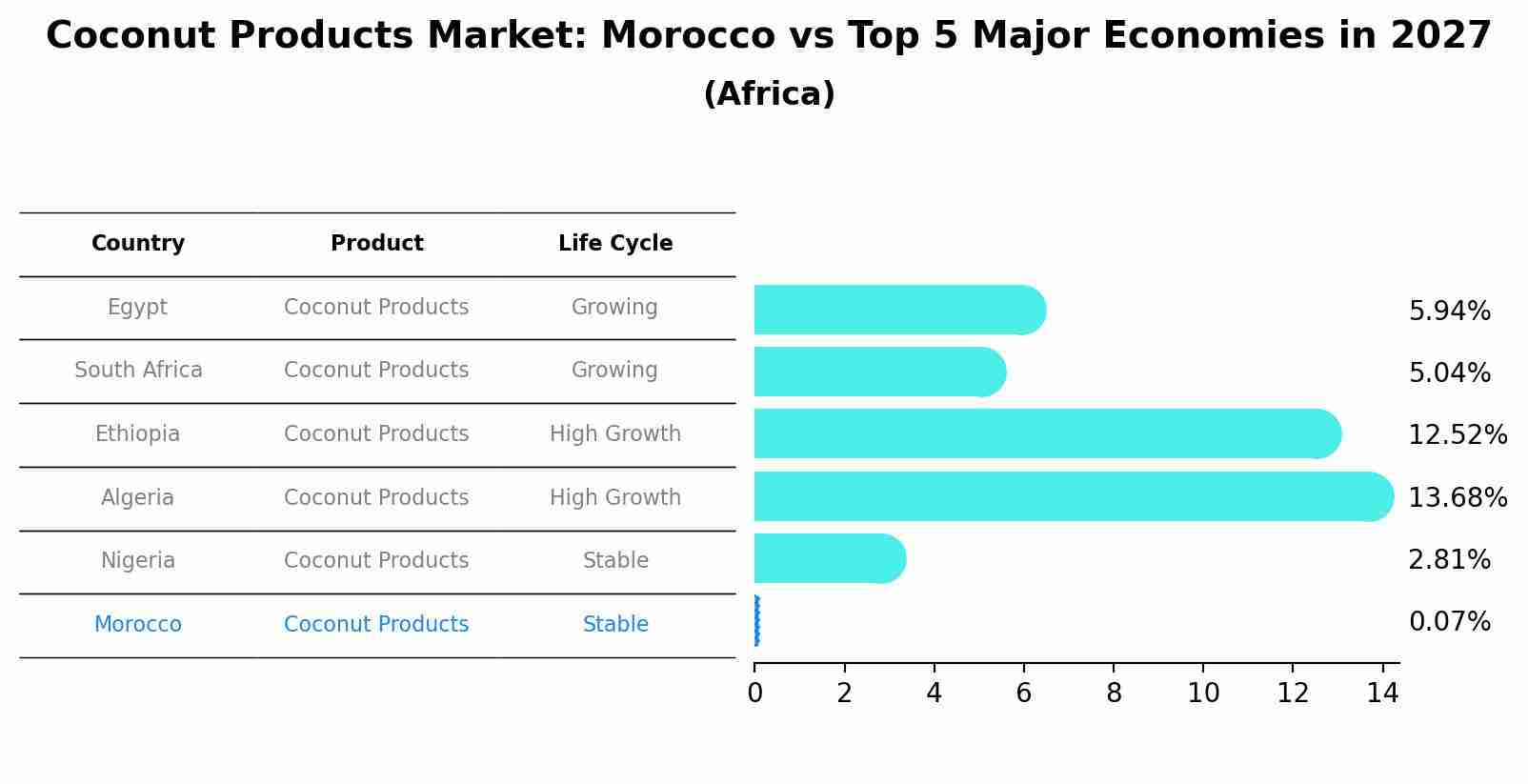Morocco Coconut Products Market (2025-2031) Outlook | Industry, Growth, Analysis, Revenue, Size, Trends, Share, Companies, Forecast & Value
| Product Code: ETC410029 | Publication Date: Oct 2022 | Updated Date: Apr 2025 | Product Type: Market Research Report | |
| Publisher: 6Wresearch | Author: Shubham Padhi | No. of Pages: 75 | No. of Figures: 35 | No. of Tables: 20 |
Morocco Coconut Products Market Size Growth Rate
The Morocco Coconut Products Market is projected to witness mixed growth rate patterns during 2025 to 2029. The growth rate begins at 0.05% in 2025, climbs to a high of 0.08% in 2028, and moderates to 0.07% by 2029.

Coconut Products Market: Morocco vs Top 5 Major Economies in 2027 (Africa)
The Coconut Products market in Morocco is projected to grow at a stable growth rate of 0.07% by 2027, within the Africa region led by Egypt, along with other countries like South Africa, Ethiopia, Algeria and Nigeria, collectively shaping a dynamic and evolving market environment driven by innovation and increasing adoption of emerging technologies.

Morocco Coconut Products Market Synopsis
Morocco market for coconut products, including coconut milk, water, desiccated coconut, and coconut oil, is expanding due to growing consumer awareness of their health benefits and versatility in culinary applications. The food and beverage industry drives the demand for coconut products, particularly for use in health-focused and exotic recipes. The cosmetics and personal care sectors also contribute to market growth with products like coconut-based lotions and shampoos. Challenges include ensuring consistent quality and supply, as well as competing with other countries that have more established coconut industries.
Drivers of the market
The market for coconut products in Morocco, including coconut water, milk, and flour, is driven by their rising popularity as health and wellness products. Increasing consumer awareness of the nutritional benefits of coconut products, such as high fiber content and essential vitamins, boosts demand. The food and beverage industry`s innovation in incorporating coconut ingredients into new products also contributes to market expansion. Moreover, the trend towards plant-based and dairy-free alternatives supports the growing use of coconut products.
Challenges of the market
Morocco coconut products market struggles with the high cost and logistics of importing raw materials. This reliance on imports makes the market susceptible to global supply chain issues and price fluctuations. Additionally, the market faces stiff competition from well-established international brands, making it difficult for local companies to establish a strong presence. Ensuring product quality and adherence to international standards also necessitates substantial investment in technology and quality control systems.
Government Policy of the market
The Morocco government`s policies for the coconut products market focus on diversification and value addition. By providing incentives for the production of various coconut-derived products, such as coconut milk, water, and desiccated coconut, the government aims to enhance the market`s competitiveness. These policies also include supporting research and development to innovate new products and improve processing techniques, as well as promoting sustainable farming practices.
Key Highlights of the Report:
- Morocco Coconut Products Market Outlook
- Market Size of Morocco Coconut Products Market, 2024
- Forecast of Morocco Coconut Products Market, 2031
- Historical Data and Forecast of Morocco Coconut Products Revenues & Volume for the Period 2021-2031
- Morocco Coconut Products Market Trend Evolution
- Morocco Coconut Products Market Drivers and Challenges
- Morocco Coconut Products Price Trends
- Morocco Coconut Products Porter's Five Forces
- Morocco Coconut Products Industry Life Cycle
- Historical Data and Forecast of Morocco Coconut Products Market Revenues & Volume By Type for the Period 2021-2031
- Historical Data and Forecast of Morocco Coconut Products Market Revenues & Volume By Coconut Water for the Period 2021-2031
- Historical Data and Forecast of Morocco Coconut Products Market Revenues & Volume By Coconut Oil for the Period 2021-2031
- Historical Data and Forecast of Morocco Coconut Products Market Revenues & Volume By Coconut Milk for the Period 2021-2031
- Historical Data and Forecast of Morocco Coconut Products Market Revenues & Volume By Dried Coconut Products for the Period 2021-2031
- Historical Data and Forecast of Morocco Coconut Products Market Revenues & Volume By Others for the Period 2021-2031
- Historical Data and Forecast of Morocco Coconut Products Market Revenues & Volume By Application for the Period 2021-2031
- Historical Data and Forecast of Morocco Coconut Products Market Revenues & Volume By Food for the Period 2021-2031
- Historical Data and Forecast of Morocco Coconut Products Market Revenues & Volume By Beverage for the Period 2021-2031
- Historical Data and Forecast of Morocco Coconut Products Market Revenues & Volume By Cosmetics for the Period 2021-2031
- Historical Data and Forecast of Morocco Coconut Products Market Revenues & Volume By Others for the Period 2021-2031
- Historical Data and Forecast of Morocco Coconut Products Market Revenues & Volume By Form for the Period 2021-2031
- Historical Data and Forecast of Morocco Coconut Products Market Revenues & Volume By Solid for the Period 2021-2031
- Historical Data and Forecast of Morocco Coconut Products Market Revenues & Volume By Liquid for the Period 2021-2031
- Morocco Coconut Products Import Export Trade Statistics
- Market Opportunity Assessment By Type
- Market Opportunity Assessment By Application
- Market Opportunity Assessment By Form
- Morocco Coconut Products Top Companies Market Share
- Morocco Coconut Products Competitive Benchmarking By Technical and Operational Parameters
- Morocco Coconut Products Company Profiles
- Morocco Coconut Products Key Strategic Recommendations
Frequently Asked Questions About the Market Study (FAQs):
- Single User License$ 1,995
- Department License$ 2,400
- Site License$ 3,120
- Global License$ 3,795
Search
Thought Leadership and Analyst Meet
Our Clients
Related Reports
- Germany Breakfast Food Market (2026-2032) | Industry, Share, Growth, Size, Companies, Value, Analysis, Revenue, Trends, Forecast & Outlook
- Australia Briquette Market (2025-2031) | Growth, Size, Revenue, Forecast, Analysis, Trends, Value, Share, Industry & Companies
- Vietnam System Integrator Market (2025-2031) | Size, Companies, Analysis, Industry, Value, Forecast, Growth, Trends, Revenue & Share
- ASEAN and Thailand Brain Health Supplements Market (2025-2031) | Strategy, Consumer Insights, Analysis, Investment Trends, Opportunities, Growth, Size, Share, Industry, Revenue, Segments, Value, Segmentation, Supply, Forecast, Restraints, Outlook, Competition, Drivers, Trends, Demand, Pricing Analysis, Competitive, Strategic Insights, Companies, Challenges
- ASEAN Bearings Market (2025-2031) | Strategy, Consumer Insights, Analysis, Investment Trends, Opportunities, Growth, Size, Share, Industry, Revenue, Segments, Value, Segmentation, Supply, Forecast, Restraints, Outlook, Competition, Drivers, Trends, Demand, Pricing Analysis, Competitive, Strategic Insights, Companies, Challenges
- Europe Flooring Market (2025-2031) | Outlook, Share, Industry, Trends, Forecast, Companies, Revenue, Size, Analysis, Growth & Value
- Saudi Arabia Manlift Market (2025-2031) | Outlook, Size, Growth, Trends, Companies, Industry, Revenue, Value, Share, Forecast & Analysis
- Uganda Excavator, Crane, and Wheel Loaders Market (2025-2031) | Strategy, Consumer Insights, Analysis, Investment Trends, Opportunities, Growth, Size, Share, Industry, Revenue, Segments, Value, Segmentation, Supply, Forecast, Restraints, Outlook, Competition, Drivers, Trends, Demand, Pricing Analysis, Competitive, Strategic Insights, Companies, Challenges
- Rwanda Excavator, Crane, and Wheel Loaders Market (2025-2031) | Strategy, Consumer Insights, Analysis, Investment Trends, Opportunities, Growth, Size, Share, Industry, Revenue, Segments, Value, Segmentation, Supply, Forecast, Restraints, Outlook, Competition, Drivers, Trends, Demand, Pricing Analysis, Competitive, Strategic Insights, Companies, Challenges
- Kenya Excavator, Crane, and Wheel Loaders Market (2025-2031) | Strategy, Consumer Insights, Analysis, Investment Trends, Opportunities, Growth, Size, Share, Industry, Revenue, Segments, Value, Segmentation, Supply, Forecast, Restraints, Outlook, Competition, Drivers, Trends, Demand, Pricing Analysis, Competitive, Strategic Insights, Companies, Challenges
Industry Events and Analyst Meet
Whitepaper
- Middle East & Africa Commercial Security Market Click here to view more.
- Middle East & Africa Fire Safety Systems & Equipment Market Click here to view more.
- GCC Drone Market Click here to view more.
- Middle East Lighting Fixture Market Click here to view more.
- GCC Physical & Perimeter Security Market Click here to view more.
6WResearch In News
- Doha a strategic location for EV manufacturing hub: IPA Qatar
- Demand for luxury TVs surging in the GCC, says Samsung
- Empowering Growth: The Thriving Journey of Bangladesh’s Cable Industry
- Demand for luxury TVs surging in the GCC, says Samsung
- Video call with a traditional healer? Once unthinkable, it’s now common in South Africa
- Intelligent Buildings To Smooth GCC’s Path To Net Zero


















